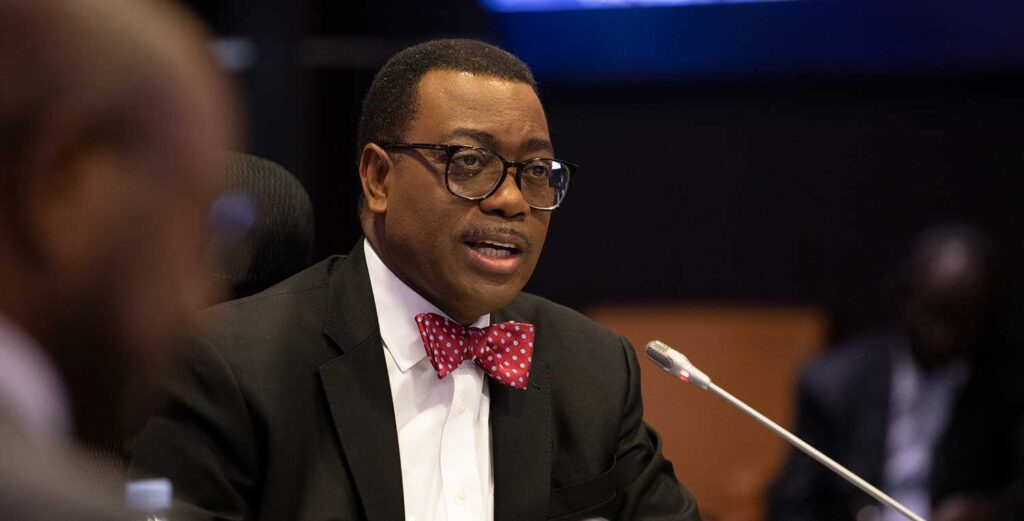Over the years, numerous economic experts and stakeholders have consistently called for improvements in Nigeria’s electricity supply. Joining this growing chorus is the President of the African Development Bank (AfDB), Akinwumi Adesina.
Speaking at the 20th Anniversary Dinner of Chapel Hill Denham in Lagos, Adesina warned that Nigeria risks long-term economic stagnation unless it decisively tackles its chronic infrastructure and power deficits.
He stressed that no country can industrialise, remain competitive, or generate employment at scale without a reliable power supply.
Adesina urged Nigerian policymakers and investors to take bold steps in reforming critical sectors if the nation is to reclaim its economic future.
READ ALSO: AfDB President Adesina urges investment in African youth over freebies
“Access to power is not just about lights,” he said. “It’s about productivity, competitiveness, and prosperity.”
He further noted that Nigeria’s digital economy cannot thrive on diesel generators, emphasising the need for a 21st-century electricity grid powered by clean, reliable, and scalable energy solutions.
To achieve this, Adesina stated that the private sector must be central to the country’s energy transition.
He also called for structural reforms to attract increased private investment in Nigeria’s energy sector.
These reforms, he said, should include cost-reflective tariffs, enforceable power purchase agreements, and improved access to blended finance from multilateral institutions such as the AfDB and the World Bank.
Adesina stressed the importance of functional markets and the need for transparent, predictable, and financially viable investment frameworks to attract investors.
He added that Nigeria has the potential to emerge as a regional leader in green energy, provided that it establishes a sound regulatory environment that encourages innovation and investment.
He revealed that the AfDB, in collaboration with the World Bank, had introduced Mission 300—a bold initiative aimed at delivering electricity access to 300 million Africans by the year 2030.
Nigeria, he said, must position itself strategically to reap the benefits of this drive. Accelerated electrification, he warned, must become a national priority.
Beyond energy, Adesina stated how Nigeria’s chronic infrastructure deficits were hindering industrial output and limiting its ability to compete across the West African region.
He enjoined the government to channel long-term funds—such as pension and sovereign wealth resources—into infrastructure development, framing it not as an option but as an economic necessity.
He called for massive investments in modern transport systems, including expressways, rail lines, high-speed trains, seaports, airports, and robust digital infrastructure.
“Unless we resolve logistics constraints,” he warned, “Nigeria will be left behind in the African Continental Free Trade Area.”
Investors, he added, are unlikely to remain in an economy where goods cannot move efficiently and communication infrastructure is weak. Infrastructure, he stressed, underpins national competitiveness.
Adesina encouraged Nigeria to embrace innovative finance strategies such as the “originate-to-distribute” model and to reduce risks around infrastructure ventures.
He also recommended developing local financial markets and expanding naira-denominated funding for large-scale initiatives.
Addressing the country’s dwindling manufacturing sector, the AfDB president pointed to Nigeria’s meagre $160 manufacturing export value per capita, in stark contrast with Vietnam’s $3,600 and Malaysia’s $7,100.
“In the 1980s, Nigeria showed industrial promise—we built vehicles, manufactured textiles, and processed food. Much of that capacity is gone, lost to other nations,” he lamented.
He noted that Nigeria had forfeited the opportunity to become Africa’s automotive hub, a position now occupied by South Africa.
To reclaim lost ground, Adesina said the country must build up its industrial capacity by transforming raw materials locally, expanding industrial zones, and streamlining the business environment.
READ ALSO: Adesina: Africa’s youths need investment, not handouts
“Crude oil, cassava, cocoa—these must not leave our shores unprocessed,” he insisted. “Adding value domestically is the key to job creation, GDP growth, and economic stability.”
He also advocated for a shift towards a knowledge-based economy anchored on research, science, and innovation. For this to happen, he said, Nigeria must invest in its higher institutions and create the right conditions to retain and attract top talent.
Agriculture, too, offers a major opportunity for economic transformation, he noted.
He highlighted the ‘Special Agro-Industrial Processing Zones’ (SAPZ) programme—a \$1.3 billion project funded by the AfDB, Islamic Development Bank, and IFAD—as a blueprint.
These zones, he said, would revitalise rural economies, create jobs for young people and women, and curb urban migration.

